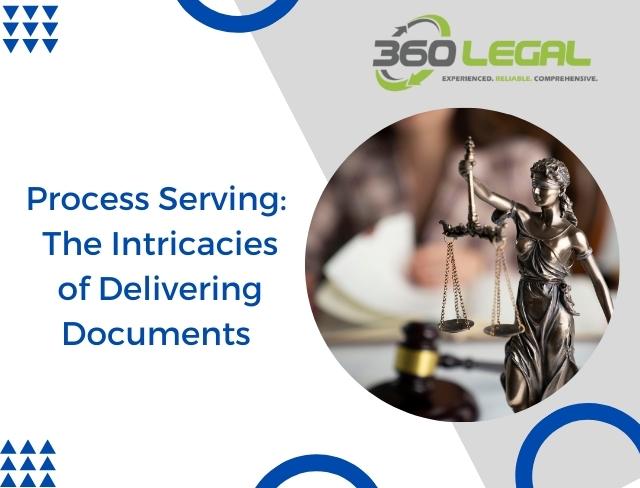The Function of Specialist Process Serving in Effective Lawful Case Monitoring
The Function of Specialist Process Serving in Effective Lawful Case Monitoring
Blog Article
Comprehending the Relevance of Refine Offering in Lawful Procedures
Refine serving is a fundamental facet of legal procedures that guarantees all celebrations are notified of their civil liberties and responsibilities. By facilitating the formal shipment of important lawful files, it promotes the concepts of due procedure and contributes to the honesty of the judicial system. Nevertheless, the nuances of efficient process offering extend beyond simple shipment; they include lawful needs and prospective repercussions of improper service. Recognizing these complexities can substantially influence the results of lawful conflicts, prompting a better assessment of the techniques that underpin this important function.
Interpretation of Process Serving
Refine serving is an essential part of the lawful system, defined as the formal shipment of legal records to individuals associated with a litigation. This process makes sure that all events are appropriately informed of legal actions being taken against them or to which they are a celebration. Usually, these files include summons, grievances, subpoenas, and various other court-related papers that need the recipient's interest and action.
The value of procedure offering hinge on its role in supporting the concepts of due process. It ensures that individuals have notice of lawful procedures, consequently offering them a chance to react or protect themselves. Proper service of procedure is not merely a step-by-step rule; it is a fundamental element of guaranteeing justness and transparency in the judicial system.
Refine offering can be conducted by numerous individuals, consisting of professional procedure servers, regulation enforcement police officers, or even lawyers, relying on administrative laws. Each method of solution has its own criteria and practices, which are crucial to avoid delays or terminations within the lawful structure. Understanding the definition and function of process serving is necessary for all stakeholders included in lawful procedures.

Legal Needs for Refine Serving
Lawful demands for procedure offering are important to ensure that the shipment of legal records abides by established protocols and is identified by the court. Each jurisdiction has certain laws governing just how and when papers must be offered, which might include summonses, issues, and subpoenas.
Normally, process-server should be neutral 3rd parties who are not associated with the situation. They have to also follow state regulations pertaining to solution methods, which can consist of personal solution, alternative solution, or solution by mail. Personal service involves delivering documents directly to the recipient, while alternative solution permits for shipment to one more liable individual at the recipient's home or business.
Additionally, procedure web servers are typically needed to submit an evidence of solution, a lawful file that confirms the distribution of papers, with the court. This record consists of details such as the date, time, and approach of service, in addition to the name of the individual offered.

Duty in the Justice System
A vital element of the justice system, process serving makes sure that people associated with legal process are properly notified of activities taken versus them (Process Serving). This official notification is essential for upholding the concepts of due procedure, which mandates that events have the possibility to react to claims made against them. Without reliable procedure serving, the legal system would be provided ineffective, as people could participate in activities without recognition of pending lawful matters
Process-server offer an essential role in securing the integrity of the lawful process. They function as neutral celebrations, providing lawful papers such as summons, complaints, and subpoenas, hence cultivating openness and liability within the judicial structure. By guaranteeing that all parties are informed, process offering helps to protect against any type of possible unreasonable advantage, enabling fair engagement in lawful proceedings.
Moreover, the professionalism and trust of process-server adds to the public's rely on the justice system. Their adherence to legal criteria and honest methods reinforces the authenticity of the judicial process. Ultimately, effective procedure offering is essential in click for info advertising the policy of law and making certain that justice comes to all individuals associated with legal disputes.
Repercussions of Improper Solution
The repercussions of improper solution can dramatically threaten the integrity of legal procedures. Improper solution can result in the defendant not being aware of the legal action versus them, which might stop them from responding appropriately or offering their defense.
Additionally, inappropriate solution can provide court orders and judgments invalid, forcing the complainant to reactivate the procedure, which can be both financially troublesome and taxing. It can additionally open the door to appeals and challenges, as the defendant might say that they were not properly notified of the procedures, complicating the lawful landscape better.
Best Practices for Effective Service

Second, timing plays a crucial duty. Serving papers quickly can protect against hold-ups in lawful process and guarantee that all parties are informed in a timely way. Additionally, hiring a specialist process-server can improve performance, as they are educated to browse prospective difficulties and make sure compliance with local laws.
Third, preserving accurate documents of the service process is important. If conflicts arise pertaining to whether service was effectively executed., documenting the date, time, and manner of service can provide crucial proof.
Conclusion
To conclude, process serving is a necessary component of article source lawful treatments, making certain that all celebrations are properly informed and managed the opportunity to respond. Sticking to legal needs and ideal practices not just promotes the concepts of due process however additionally enhances the honesty of the justice system. The repercussions of inappropriate service can cause significant hold-ups and problems, highlighting the requirement for reliable procedure offering in promoting justness and accessibility in lawful disputes.
The nuances of effective process offering expand beyond plain distribution; they incorporate lawful needs and possible consequences of click here for more info incorrect service.Refine offering is an important part of the legal system, defined as the formal distribution of legal documents to people involved in a court situation. Without reliable procedure serving, the legal system would certainly be rendered inadequate, as people might involve in activities without awareness of pending legal issues.
Refine web servers serve an important duty in securing the honesty of the lawful process - Process Serving. The repercussions of incorrect solution can lead to significant hold-ups and issues, highlighting the necessity for efficient process serving in advertising fairness and availability in legal disagreements
Report this page